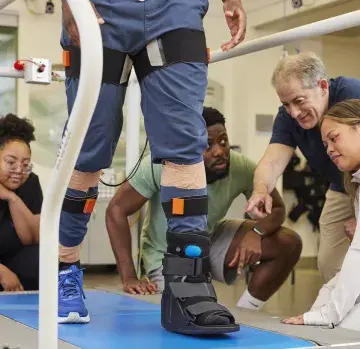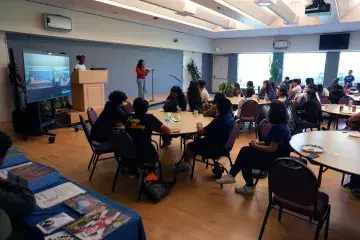Students Hope Healing Justice Will Improve Care
The night before Samuel Merritt University (SMU) student AJ Pluss was to begin her last clinical internship in physical therapy, she asked herself: “What should I remember tomorrow?”
Her answer came from drawing a tarot card: Justice.
It was a fitting choice, she says, because her dedication to “healing justice” as a way to create social change is what led her to enroll in SMU’s Doctor of Physical Therapy (DPT) program.
Healing justice is a term originally coined by Atlanta-based community organizer Cara Page to describe a collective framework to help build resilience and wellness for people of color and others who have suffered from abuse, trauma and violence.
For Pluss, her interest in healing justice began when she attended a conference for survivors of domestic abuse held by Community United Against Violence, an organization that works to promote safety in LGBTQ communities. She was particularly impressed that the conference offered participants a variety of treatment modalities, such as acupuncture and bodywork.
Though Pluss wanted to work for a nonprofit up until then, she grew increasingly attracted to healthcare.
“I wanted my career to be meaningful and to feel like I was contributing,” she says. “Radically changing how we deliver healthcare, access healthcare, and how we care for our communities is what brought me to Samuel Merritt University.”
While visiting a variety of schools, Pluss found that SMU was the only one talking about health justice, linked closely to healing justice.
“It just jumped out at me like a different kind of school,” she says. “The school impressed me with the idea that health justice was even part of the conversation.”
While the physical therapy field is not known for its ties to social justice movements, Pluss sees a connection. She says physical injuries can trigger past experiences with trauma in other parts of patients’ lives.
Like Pluss, DPT student Xiomara Rayo hopes to practice trauma-informed care and structural competence as a physical therapist to help better heal her patients.
Rayo’s path to wanting to bring social justice to healthcare began when her mother had back surgery in Mexico but couldn’t get physical therapy when she returned to the U.S. because she wasn’t insured. As a result, her mother never fully recovered and has been in chronic pain for years.
“I chose to do an internship at a physical therapy clinic because I figured maybe I would learn something to help my mom,” she says.
Rayo says she eventually chose to study at SMU because it offered so many opportunities for community service and a vision of improving the healthcare system.
“I wanted a program where we were going to be looking at a person as a whole and not just as an injury,” she says. “The thing I really value about our program is that they’ve also taught us about stressors like depression and PTSD that can affect how people perform in their everyday lives.”
Rayo, co-manager of SMU’s Students of Color Collective, and Pluss organized a day of action on campus last year to support the Standing Rock Sioux Tribe and others protesting the Dakota Access pipeline. The two women share a desire to achieve healing justice by working within the medical system to help people, particularly those who are victimized by police or hate groups.
“These are people who may be suffering physically and may not be getting the care they deserve and are not being treated for the trauma they’ve experienced,” Rayo says.
After they become licensed clinicians and gain some professional experience, Rayo hopes to create a volunteer network of physical therapists to work in free community clinics and Pluss wants to work with queer, trans and gender non-conforming people.
Ultimately, they say they would like to create an integrated treatment center that embraces healing justice and provides pro bono services to uninsured patients. Most importantly, they agree, is to attract a diverse group of practitioners.
“The intimacy of physical therapy can be a barrier if you’re working with someone you don’t feel comfortable with,” says Pluss.
Tarot card pictured in photograph by the artist Cristy C. Road in Next World Tarot card deck.


